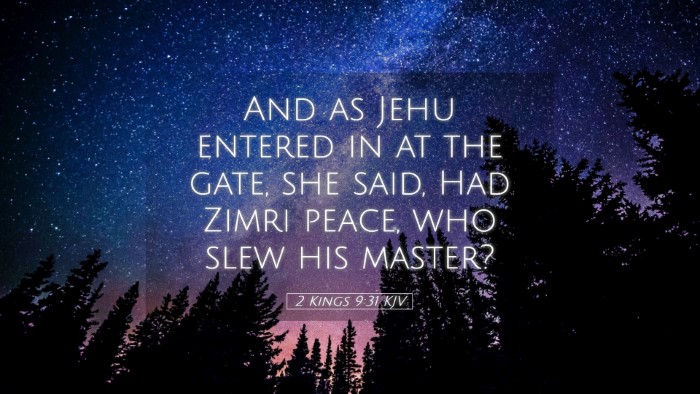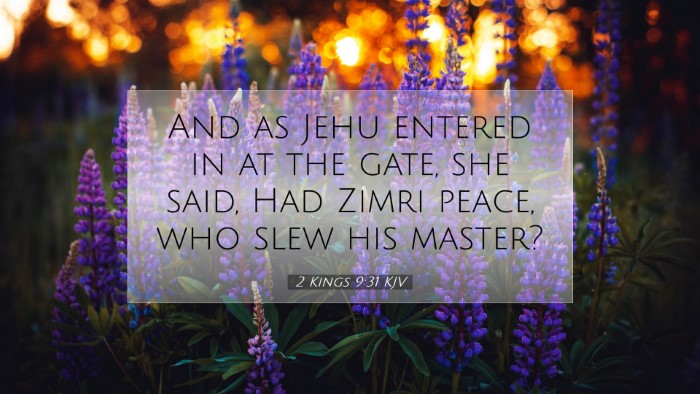Commentary on 2 Kings 9:31
The verse reads: "And as Jehu entered in at the gate, she said, Had Zimri peace, who slew his master?" This moment marks a critical point in the biblical narrative swirling around the decline of the house of Ahab and the swift rise of Jehu.
Contextual Background
The book of 2 Kings emphasizes the turbulence within Israel's monarchy, particularly during the reigns of Ahab and his offspring. Following the idolatrous patterns established by Ahab, Israel finds itself embroiled in consistent conflict with prophetic authorities and, ultimately, a divine reckoning.
Analysis of the Verse
1. Jehu's Arrival: Jehu is no ordinary figure; he is anointed by God through the prophet Elisha to eradicate the house of Ahab (2 Kings 9:6-10). His entry into the palace signifies the impending doom for Jezebel and her followers.
2. Jezebel's Challenge: Jezebel’s reference to Zimri is critical. Zimri was a king of Israel known for assassinating his master, Elah, and reigning only seven days before facing an insurrection. Jezebel implicitly threatens Jehu with the same fate, showcasing her awareness of what happens to those who rise against a reigning monarch.
3. The Thematic Contrast: The verse starkly contrasts Jehu's intended reform and Jezebel's defiant posture. Whereas Jehu symbolizes divine judgment and the execution of God's will, Jezebel represents rebellion and idolatry.
Theological Insights
1. The Nature of Divine Judgment: Commentators agree that Jehu's mission is steeped in the context of divine judgment. Matthew Henry emphasizes that God's judgment often comes through human agents who may not themselves be perfect.
2. Human Agency in God's Plan: Albert Barnes notes that despite Jehu's violent means, he serves God's purpose in removing idolatry from Israel. This duality presents a critical point of discussion for theologians regarding how God uses imperfect vessels to fulfill His plans.
Lessons for Today
- Judgment vs. Mercy: The narrative serves as a reminder of the balance between divine justice and human agency, highlighting God's sovereignty in governance.
- Confronting Evil: Jehu’s confrontation with Jezebel prompts believers to reflect on their own engagements with wickedness in contemporary society.
- Persistence of Idolatry: Jezebel's role is quintessential for understanding the challenges posed by idolatry, which remains pertinent in today's context of secularism and materialism.
Conclusion
In summary, 2 Kings 9:31 encapsulates the tension between divine purpose and human pride. Jehu's arrival heralds judgment, while Jezebel’s taunt encapsulates the spirit of defiance against divine authority. This verse not only serves as historical narrative but also as a profound theological statement regarding the nature of kingship, authority, and the dire consequences of rebellion against God.
Additional Reflections
Future discussions can further unearth parallels to modern leadership struggles within the Church and society, showing that the essence of recognizing divine authority continues to be paramount across all generations.


